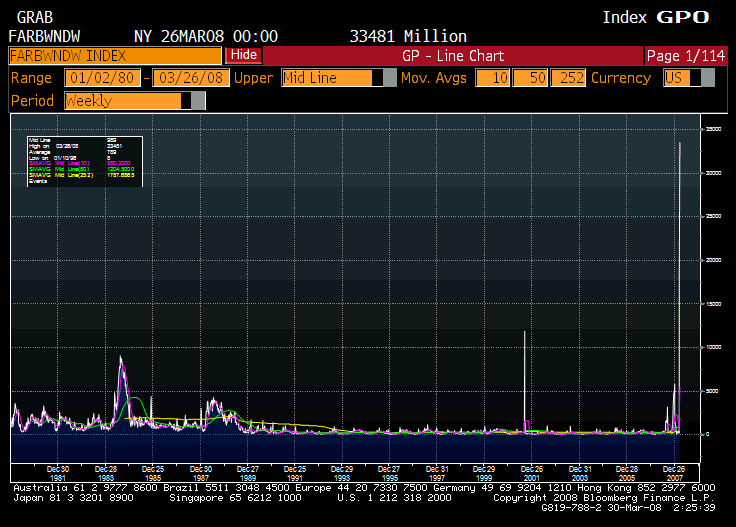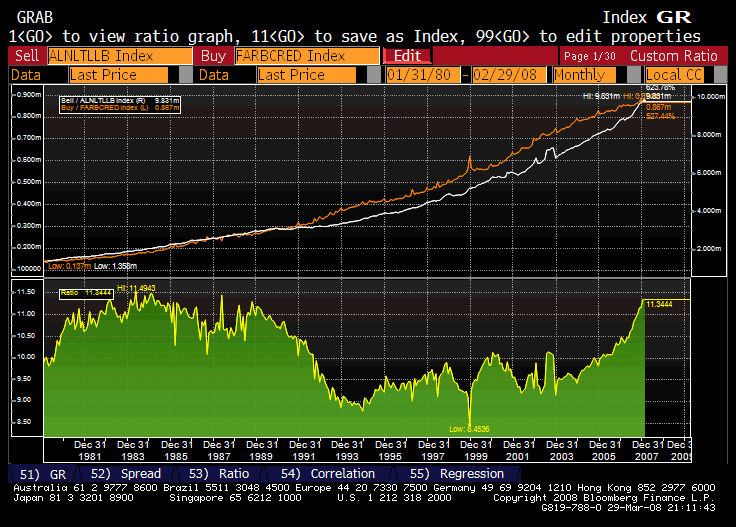Personal notes before I get started: I’ve been busy studying for the Series 7 (and also reviewing the compliance manual for my new firm — wow it is big). The two of them fit together, as I get to see how the regulations get applied. I’ve made through the study guide (what do you do when it is wrong — not that I found a lot of errors, maybe half a dozen?), and I am 20% through my first practice test. Went and got fingerprinted for the fourth time in my life yesterday. (The other three times were for adoptions.)
My links are back 🙂 but I had to give up my descriptive permalinks. 🙁 Maybe I’ll get them back when I upgrade the blog to WordPress 2.5.1. Beyond that, I am working on a book review for Gene Marcial’s forthcoming book, “7 Commandments of Stock Investing.”
Catching up on the markets:
Our Unorthodox Federal Reserve, GSEs and Government
1) Repo rates may not be negative now, but they were so recently. Fails (failures to deliver securities) become common, because of the lack of a penalty. Today we should see whether the TSLF has any impact on the scarcity of Treasuries. We should learn more about the direct landing program as well after the close today. It got off to a big start last week. Watch for the H.4.1 report after the close. Given all that is going on, it is becoming the critical weekly Fed document.
2) Now, because of all these actions on the asset side of the Fed’s balance sheet, some are calling the actions of the Fed, including the Bear Stearns bailout, revolutionary. Well, maybe. It’s certainly different than before, but there is a cost to doing business this way. Bit by bit the Fed loses flexibility as more and more of its highest quality assets become encumbered for a time.? The more that they do, also, the harder it will be to unwind, in my opinion.
3)? Greenspan…? If we turn off the spotlight, will he go away?? (Then again, he has enough money to buy his own spotlight.)? It is tough for anyone to defend a legacy, and I don’t blame him for trying, but the Fed became too integrated with the political establishment under his tenure, which made it too activist in avoiding short-term pain.? It made him look like a hero at the time, but now we are paying the price.? Overly loose monetary policy and financial supervision led to gluts of borrowing to finance assets that appreciated dramatically, until the ability to service the debt began to decrease.? I don’t think history will treat him kindly.? He said too much in the past that he is contradicting today.
4) Will the Fed buy agency MBS outright?? I think the answer to that one is yes, if the crisis persists. If housing prices drop enough further, like say 15%, the actions of the Treasury, Fed, FHLB, Fannie, Freddie, FHA, and whatever new lending monstrosity our imaginative Government comes up with will have to be closely coordinated.? At some level, if the Fed can’t trust the implicit guarantee of Fannie and Freddie, why should the rest of us?? That guarantee is as sound as a dollar! 😉
5)? It’s interesting to see the tide shift with respect to GSE involvement in the mortgage market:
6)? On a consolidated basis, our government, with its enterprises, are levering up.? This is a substitution of public debt for private, and more, just a lowering of capital standards for the GSEs.? (I wonder how comfortable the rating agencies are with this?)? This works while Treasury yields are low.? I wonder, though, how much impact this will have on the willingness of foreign buyers of Treasuries to continue their funding of our government?? One thing for sure, this will all get funded by the US taxpayers, together with those who lend to the US (dollar depreciation).
7) Now, it’s not as if the US is the only place in the world with central banking problems.? Consider the Eurozone, where there is still no lender of last resort.? How would they deal with a financial crisis?? I’m not sure; the ECB has quietly helped out some Spanish banks, but it is not really in their jurisdiction.? Under conditions of deflationary stress, it would not be impossible to see a nation whose financial system was in trouble either directly bail out the dud institutions, or even, exit the euro (last resort, but not impossible).
Or consider China, where inflation is getting a nice head of steam.? Their neomercantilism, with their crawling peg against the dollar is forcing them to import loose monetary policy from the US.? As the article cited points out, they need to significantly revalue their currency upward, which would would whack their exports, at least for a time.
8 )? For those that remember the files that I created for my piece, A Social View of the FOMC, it looks like I will have to update the file soon.? We have a successor to Bill Poole nominated, James Bullard.? When he is approved, I will update the file.? (I will miss Poole.? Though he was occasionally out of step with the rest of the FOMC, he always spoke his mind, which was usually more hawkish than the rest of the FOMC.)
9)? Now, Bullard is an Economics Ph. D.? (Surprise!) ? In my earlier piece, Jeff Miller took note of a few of the things that I said, and perhaps attributed to me an anti-Academic bias.? I don’t have a bias against academics, per se.? (Hey, can we put Steve Hanke on the Fed?!? One of my professors…)? I do have concerns about not having enough real debate.? If the neoclassical view of monetary policy is correct, then we don’t have problems, because everyone on the FOMC is either a neoclassical economist, or a monetarist.
Now, I do know the difference between politics and policy formation, and if I hadn’t been trying to keep the number of pages down, I might have had two columns.? (Getting it down to 15 pages was hard.)? But most of the FOMC members had either one or the other, but not both, so I left it as one column.? Next time I change the column heading.? That said, even if one is in a policymaking capacity in the executive branch, there is typically some political affiliation that helps get that person the job.? Those are relevant bits of experience, just as I noted everyone that had foreign experience, or military experience.? But what worries me is a lack of real diversity in views of how economics works.? (Perhaps we could get someone from the Santa Fe Institute?)
10) Finally, there will be a lot of pressure in the future to re-regulate our financial system.? Personally, I don’t think it is possible to create a regulatory scheme that eliminates crises.? The regulator shapes the type of crisis that will come, and when it will come, but it is impossible to wipe out the boom-bust cycle.? (We put off this bust for a long time, and now we are getting it with compound interest for time delay.)? If a regulatory regime is too tight, the financial companies complain because their ROEs are too low.? To the extent that it can, capital begins to exit the industry, or, the stock prices languish, and financials trade at low multiples on book, because they can’t earn much off their net worth.
Financial companies find the weak spots in any risk-based capital formula.? They also lobby the executive branch and Congress effectively.? Unless we slide into Great Depression II, I don’t think things will change remarkably from here.
I? agree that we need to re-regulate, but perhaps after this crisis is done, we can consider systemic reforms, and not the piecemeal stuff we have been dished up in the name of crisis management.? My re-regulation would be to reduce the Federal Government’s role in the credit markets, but then, I am walking out of step, and realize that is not what is going to happen.



